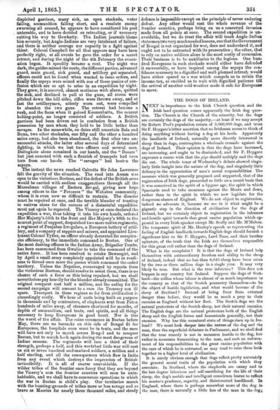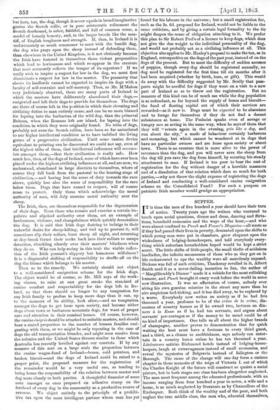THE DOGS OF IRELAND.
NEXT in importance to the Irish Church question and the Irish land question comes apparently the Irish dog ques- tion. The Church is the Church of the minority, but the dogs are certainly the dogs of the majority,—at least if we may accept Sir Robert Peel's population return of 3,000,000 dogs, and trust Sir F. Heygate's bitter assertion that no Irishman seems to think of doing anything without having a dog at his heels. Apparently the landlords of Ireland, naturally more directly interested in sheep than in dogs, contemplate a wholesale crusade against the dogs of Ireland. Their opinion is that the dogs have increased, are increasing, and ought to be diminished, and Sir F. Ileygate expresses a coarse wish that the pigs should multiply and the dogs die out. The whole tenor of Wednesday's debate showed singu- larly little insight into the nature of the dog, and singularly little delicacy in the appreciation of man's moral responsibilities. The measure which was generally proposed and supported, that of the registration of Irish dogs, proceeded so little on a sound basis that it was conceived in the spirit of a bygone age, the spirit in which Spaniards used to take measures against the Moors and Jews, rather than in the spirit in which we now legislate for the dangerous classes of England. We do not object to registration, indeed we advocate it, because we see in it what might be a gigantic step in the direction of civilization for the dogs of Ireland, but we certainly object to registration in the inhuman and hostile spirit towards that great canine population which ap- peared in every Irish speaker except Mr. Scully and Mr. M'Mahon. The temperate spirit of Mr. Henley's speech as representing the feeling of English landlords towards English dogs should furnish a significant hint to Sir F. Heygate, Lord Naas, and their brother agitators, of the truth that the Irish are themselves responsible for this great evil rather than the dogs of Ireland.
What is the complaint ? It is that the dogs of Ireland help themselves with extraordinary freedom and ability to the sheep of Ireland, indeed that no leas than 8,040 sheep have been eaten by the two or three million dogs in a single year. It may very likely be true. But what is the true inference? This does not happen in any country but Ireland. Suppose the dogs of Scot- land—the collies whose labour is almost of as much importance to the country as that of the Scotch peasantry themselves—to be the object of hostile legislation, and what would become of the sheep of Scotland? Instead of being freer from external danger than before, they would be as much a prey to their enemies as England without her fleet. The Scotch dogs are the natural protectors of the Scotch sheep, not their natural enemies. The English dogs are,the natural protectors both of the English sheep and the English farina and homesteads generally, not their enemies. Why has this unnatural state of things risen up in Ire- land? We must look deeper into the nature of the dog and the man, than the superficial debaters in Parliament, and we shall find that the true remedy is not in measures hostile to the dog, but rather in measures humanizing to the man, and such an enforce- ment of his responsibilities to the great canine population with the care of which he is entrusted, as may tend to raise them both together to a higher level of civilization. It is surely obvious enough that dogs reflect pretty accurately the general moral traits of the population with which they associate. In Scotland, where the shepherds are canny and to the last degree laborious and self-sacrificing for the life of their sheep, the dog's mobile and intelligent conscience learns to reflect his master's prudence, sagacity, and disinterested hardihood. In England, where there is perhaps somewhat more of the dog in the man, there is naturally a little less of the man in the dog; but here, too, the dog, though it never equals in broad imaginative genius the Scotch collie, or in pure aristocratic refinement the Scotch deerhound, is sober, faithful, and full of common sense, a model of homely honesty, and, in the larger breeds like the mas- tiff, of English toughness and strength. If, then, in Ireland it is unfortunately so much commoner to meet with the bandit dog, the dog who preys upon the sheep instead of defending them, than elsewhere in the United Kingdom, is it not obviously because the Irish have fostered in themselves those violent propensities -which lead to lawlessness and which re-appear in the creature that most accurately reflects the temper of its superiors ? If we really wish to inspire a respect for law in the dog, we must first disseminate a respect for law in the master. The peasantry that shoots its landlords cannot be expected to inspire its dogs with a faculty of self-restraint and self-mastery. Then, as Mr. M'Mahon very judiciously observed, there are many parts of Ireland in which the masters have deliberately abandoned their dogs,— emigrated and left their dogs to provide for themselves. The dogs are there of course left in the position in which their elevating and civilizing duties to man entirely cease, and can be no more blamed for lapsing into the barbarism of the wild dog, than the primeval Britons, when the Romans left our island, for lapsing into the condition in which they were originally found. No tribe of dogs, probably not even the Scotch collies, have been so far assimilated to our higher intellectual condition as to have imbibed the living germs of a progressive civilization. Until some canine device equivalent to printing can be discovered we could not say, even of the highest tribe of them, that intellectual influences will accumu- late amongst them,—that their civilization is really safe. How much less, then, of the dogs of Ireland, none of which have ever been placed under the highest civilizing influences at all, and are now, we understand, abandoned in large districts to themselves, where of course they fall back from the pastoral to the hunting stage of civilization,—and having lost the sense of duty towards the race above, quickly lose also the sense of responsibility for the race below them. Dogs that have ceased to respect, will of course cease to protect. Only those which acknowledge the moral authority of man, will duly exercise moral authority over the sheep.
The Irish, then, are themselves responsible for the degeneration of their dogs. Even those who remain and exercise a certain im- pulsive and slipshod authority over them, set an example of lawlessness, violence, and changefulness which quickly demoralizes • the dog. It is said that Irish dogs desiring to indulge in their unlawful desire for sheep-killing, and tied up to prevent it, will sometimes slip their collars, hunt sheep all night, and returning at day-break thrust their necks back into their collars to escape detection, chuckling, silently over their masters' blindness when they do so. Who can help seeing in this trait the visible reflec- tion of the Irish peasant's slippery but humorous wilfulness? It is a disgraceful shifting of responsibility to shuffle off on the dog the blame which belongs to his master.
Then as to the remedy. We certainly should not object to a well-considered emigration scheme for the Irish dogs. The object would be of course, as Mr. Mill says of the work- ing classes, to raise at one great stroke the standard of canine comfort and respectability for the dogs left in Ire- land, so that there should no longer be any temptation for any Irish family to profess to keep more dogs than it can, up to the measure of its ability, look after,—and no temptation amongst the dogs to get loose upon society, and become either dogs about town or barbarous mountain dogs, for want of proper care and attention in their nominal homes. Of course, however, the canine imigris should be attached to suitable masters, and should bear a stated proportion to the number of human families emi- grating with them, or we might be only repeating in the case of dogs the old transportation blunder, and might soon receive from the colonies and the United States threats similar to those which Australia has recently levelled against our convicts. If by any measure of this sort on a large scale the proportion between the canine wages-fund of Ireland—bones, cold potatoes, and broken biscuit—and the dogs of Ireland could be raised to a proper point, the proposed measure for the registration of the remainder would be a very useful one, as tending to bring home the responsibility of the relation between master and dog more closely to both parties. A thoughtful financier of some note amongst us once proposed an adhesive stamp on the forehead of every dog in the community as a productive source of revenue. We object entirely to the principle of a prohibi- tive tax upon the most intelligent partner whom man has yet
found for his labours in the universe ; but a small registration fee, such as the 2s. 6d. proposed for Ireland, would not be liable to the same criticism, and by giving a certain legal formality to the tie might deepen the sense of obligation attaching to it. We prefer this plan to Sir Robert Peel's of a licence to keep dogs, which does not give the due weight to the individual personality of the dog, and would not probably act as a civilizing influence at all. This objection also applies to Mr. Henley's proposal to make the tax, as in England, retrospective on the dogs of the past year, instead of on the dogs of the present. But to meet the difficulty of sudden amazes of puppies, though every dog should be registered annually, no dog need be registered for the first time till six months after it had been acquired (whether by birth, loan, or gift). This would do away with the difficulty suggested by Mr. Scully that pass- ports might be needful for dogs if they went on a visit to a new part of Ireland so as to throw out the registration. But no measure of this kind can be of much use while the dog population is so redundant, so far beyond the supply of bones and biscuit— the fund of floating capital out of which their services are rewarded—as it now is. Dogs must be expected to be absentees and to forage for themselves if they do not find a decent subsistence at home. The Psalmist speaks even of savage or hungry men as acting in the same way, when he says of them that they will "return again in the evening, grin like a dog, and run about the city," a mode of behaviour certainly barbarous and menacing, but which cannot be wondered at in dogs that have no particular owners and are loose upon society or about town. There is no creature that is more alive to the power of reverence than the dog, and you will never save the sheep from the dog till you save the dog from himself, by securing his steady attachment to man. If Ireland is too poor to bear the coat of registration for the dog without danger of a horrible massacre and of a dissolution of that relation which does so much for both parties,—why not throw the slight expense of registering the dogs of Ireland and conducting a well-considered canine emigration scheme on the Consolidated Fund? For such a purpose on patriotic Irish member would grudge an appropriation.































 Previous page
Previous page